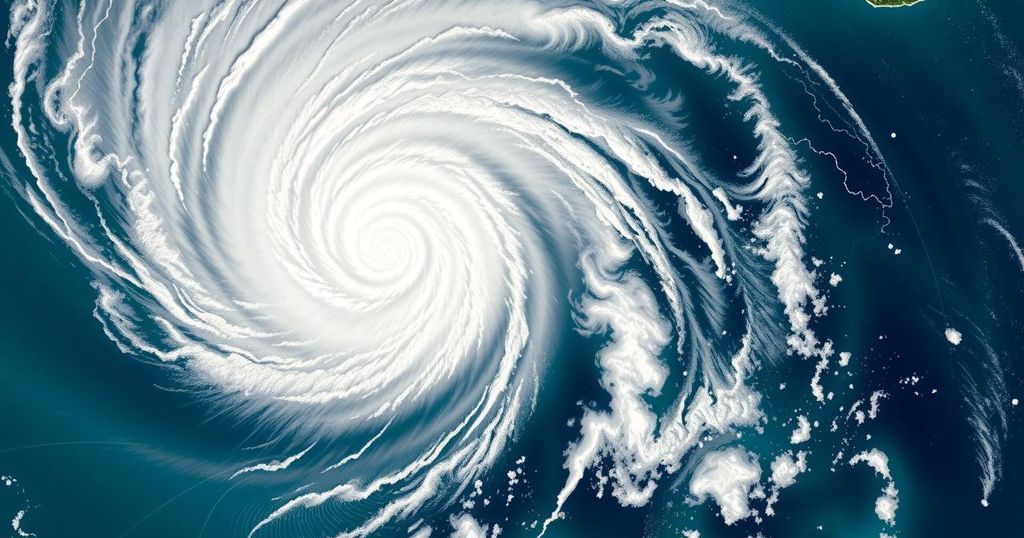Weather
World news
AFRICA, ANA CRISTINA, CHI, CHIDO, CLIMATE CHANGE, DIANA, DISASTER MANAGEMENT, EUROPE, FRANCE, FREDERIC LEGUILLIER, INTERIOR MINISTRY, MAYOTTE, MOZAMBIQUE, MOZAMBIQUE NATIONAL METEOROLOGICAL INSTITUTE, NAMPULA, NATIONAL EMERGENCY OPERATIONS CENTER, NATIONAL WEATHER SERVICE, NATURAL DISASTER, NATURAL DISASTERS, PARIS, RAIN, ZIMBABWE
Sofia Rodriguez
0 Comments
Indian Ocean Islands Prepare for Cyclone Chido as Alerts Intensify
Cyclone Chido is approaching the Indian Ocean islands of Comoros, Madagascar, and Mayotte, prompting alerts and emergency measures. Anticipated landfall on Africa’s east coast may impact over 2 million people in Mozambique alone, with warnings for potential flooding and waterborne diseases following the storm.
The islands of Comoros, Madagascar, and Mayotte are preparing for the arrival of Cyclone Chido, an intense tropical storm currently on its trajectory towards Africa’s east coast. In anticipation of the cyclone’s impact, Comoros has mandated the closure of schools, expecting adverse effects as soon as early Saturday. Cyclone Chido is projected to traverse the northern tip of Madagascar before making landfall on the mainland, affecting parts of Mozambique.
The French territory of Mayotte, positioned south of Comoros, has been placed on red alert, the highest weather warning level, starting Friday night. Notably, Mozambique has also issued a red alert for its northern provinces, Cabo Delgado and Nampula, predicting that more than 2 million individuals could potentially be impacted when the cyclone reaches the continent, expected early Sunday. The Mozambique National Meteorological Institute anticipates winds reaching up to 200 kilometers per hour (124 miles per hour).
Ana Cristina, the director of the National Emergency Operations Center in Mozambique, noted, “We believe that we can initially start working with an estimate of around 2.5 million people in the provinces of Cabo Delgado and Nampula who may be affected and will need to be rescued.” Additionally, even landlocked Zimbabwe has been forewarned about potential impacts from Cyclone Chido.
In Madagascar, alerts were disseminated through cell phones and radio broadcasts, urging residents to take necessary precautions. Some evacuations have commenced in the northern region of Diana, expected to bear the brunt of the cyclone’s wrath. Authorities have issued a warning indicating imminent danger to the populace in that area, where nearly 20,000 individuals could be affected. Supplies of food and emergency equipment, including water pumps and generators, have been provided to assist the northern region since Tuesday.
The French government has mobilized approximately 110 personnel to Mayotte, encompassing emergency responders from the mainland and firefighters from Reunion Island. This contingent includes three tons of emergency supplies, as highlighted by Col. Frédéric Leguillier, head of Mayotte’s fire and rescue service.
Cyclone season in the region, spanning December through March, has seen a marked increase in cyclone intensity, attributed to climate change. Recent cyclones have resulted in devastating outcomes, such as Cyclone Idai in 2019, which claimed over 1,300 lives across Mozambique, Malawi, and Zimbabwe, and Cyclone Freddy, which resulted in more than 1,000 fatalities last year. Crisis24, a risk management firm, has warned that Cyclone Chido may lead to significant flooding and landslides, potentially triggering outbreaks of waterborne diseases such as cholera, as well as instances of dengue fever and malaria.
The islands of Comoros, Madagascar, and Mayotte face threats from Cyclone Chido, indicative of the broader environmental challenges presented by cyclones in the Indian Ocean region, particularly from December to March, which is recognized as cyclone season. Historical precedence establishes a troubling pattern, wherein recent cyclones have wreaked havoc in Mozambique and other neighboring nations, underscoring an urgent need for preparedness and responsive measures to safeguard lives and property. The worsening frequency and intensity of cyclones have been linked to climate change, further complicating regional emergency responses.
In summary, as Cyclone Chido approaches, the islands of Comoros, Madagascar, and Mayotte are implementing precautionary measures. With vast numbers of individuals potentially impacted, there is a coordinated effort across local and international agencies to mitigate damage and enhance emergency response capabilities. As the cyclone season continues to exhibit increasing threats, the pattern suggests a critical need for sustained vigilance and effective disaster preparedness strategies in the region.
Original Source: abcnews.go.com




Post Comment